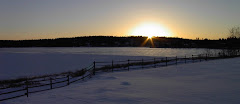The William decision has implications for provincial jurisdiction, private property
GORDON GIBSON
ggibson@bc-home.
January 17, 2008
http://www.theglobe
The B.C. Supreme Court's William decision on Indian rights and title is the most important case since Delgamuukw some 10 years ago. It could lead to a constitutional crisis. One issue is the suggested federalization of a very large fraction of B.C. Crown lands. The other is a renewed suggestion of Indian title over most private property in the province. Deeply worried governments are saying nothing.
The case is named after Chief Roger William of the Xeni Gwet'in First Nation claiming ownership of more than 4,000 square kilometres of central B.C. It spanned five years, 339 court days, cost the taxpayers $30-million and ... amazingly, made no specific title award.
But, as the courts have been doing lately, the decision put a heavy thumb on the Indian side of the bargaining scales.
While the Supreme Court of Canada in Delgamuukw said "aboriginal title" may exist and set out the characteristics of such title and broad rules for its establishment, not one square inch had been so identified pre-William.
Mr. Justice David Vickers in William gave an opinion - not a ruling for technical reasons, but a very informed opinion - that the aboriginal title of this one small group of about 400 people spans about 2,000 square kilometres, a bit smaller than Metro Vancouver or about half of Greater Toronto. (There are 200 other bands in British Columbia, all with large claimed territories.
Aboriginal title applies to lands exclusively occupied in 1846 and not surrendered since then. "Occupation" is to be generously construed: one kilometre on each side of a river, for example, and Judge Vickers appears to give similar respect to "foot trails," etc. If the Judge Vickers approach is sustained on appeal, B.C. Indians have a reasonable expectation of court-ordered ownership of a large fraction of the province.
Perhaps more importantly, the court stated that whatever is found to be Indian title land is subject to federal law - not provincial. More than 100 per cent (due to overlaps) of B.C. is claimed as Indian land.
Of course, the forests, waters and mines would not disappear. But there would be new owners, exempt from taxation, and under Ottawa's control. As the judge says in his summary: "Aboriginal title land is not 'Crown land' as defined by provincial forestry legislation ... The jurisdiction to legislate with respect to Aboriginal title land lies with the federal government pursuant to s. 91(24) of the Constitution Act ..."
To explain, Section 91(24) is that explicitly racist section of the Constitution that gives Ottawa power over "Indians, and lands reserved for the Indians." Should you think "racist" too strong, I refer you to Supreme Court of Canada Justice Ian Binnie, who said of the section, "But it is race based authorization. That is all it is."
What this means, if sustained, is that Ottawa, not Victoria, would regulate much of B.C., including the more habitable parts. Even Ottawa's powers might be severely limited by the Supreme Court of Canada's "justification" test that is required for any limitation of aboriginal rights. Forest companies, mining companies, ranchers, B.C. Hydro, road builders, policemen, municipal governments and others, take note and consider your title and permits. To call this a constitutional bombshell is an understatement, unless one has nuclear in mind.
Judge Vickers then says of private lands in the area: "The Province has no jurisdiction to extinguish Aboriginal title and such title has not been extinguished by the conveyance of fee simple title." ("Fee simple" is what you have, or thought you had, if you own a house.) This calls into question any property subject to Indian title and not originally conveyed by way of pre-Confederation or federal Crown grant. This would draw Metro Vancouver into the net.
Of course all this is not new. The court said as much in Delgamuukw, but the language was opaque and the issue has been hidden. Ten years later Judge Vickers resurrects it with devastating clarity.
It is hard to think of anything more fundamental in the law, or more explosive politically, than private property. Indeed, treaty negotiations have always presumed that private lands are not in play. Not true.
Premier Gordon Campbell has been seeking a "new relationship" with the province's aboriginal people, but maybe not this one. The Premier's initial reaction to the decision was for a four-month cooling off period and talks with Mr. William, but both the federal and provincial governments have now filed notices of appeal.
This will be as disruptive to the treaty process as was Delgamuukw 10 years ago. A court has suggested a major change in the balance of power so, for the moment, confusion reigns. From the Indian side of the table, why bargain about land if you can get the best parts through the courts?
Ultimately this will end up in the Supreme Court of Canada. It is a powerful, careful judgment, not to be ignored. Under our Constitution the Supremes can do anything they want in matters Indian. They make the law. So they could find B.C. will not be federalized after all, who knows? However, the private lands part of Judge Vickers's decision will be harder to change as it directly flows from a previous Supreme Court judgment.
Ultimately the solution could be a constitutional amendment for British Columbia to clarify things. Such a constitutional amendment would likely pass since provincial jurisdiction and private property are basics of Canada.
The Constitution is meant to reflect our core values - and one way or another that will be achieved.

No comments:
Post a Comment